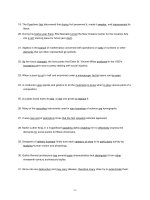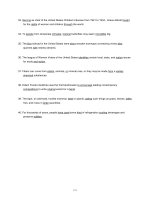Tài liệu TOEFL STUDY GUIDE PART 4 Reading Comprehension doc
Bạn đang xem bản rút gọn của tài liệu. Xem và tải ngay bản đầy đủ của tài liệu tại đây (12.4 KB, 6 trang )
TOEFL STUDY GUIDE
PART 4
Reading Comprehension Tips
Test Design Features Tips 60 - 62
Length: 70 - 90 minutes
Number of questions:
m 44 - 60 questions:
n 4 - 5 passages of 250 - 350 words in length
n with 10 - 14 questions per passage
Linear section - because the Reading section is linear, test
takers can go back and forth between the questions in a set
or between sets.
Types of Reading questions
m Mostly traditional multiple-choice questions (1
question stem with 4 options)
m Some new question types:
n Test takers must interact more directly with
the text by clicking on or inserting text:
n Clicking on a sentence or paragraph within a
passage to find a main idea
n Clicking on a word or phrase within a
passage to test vocabulary/pronoun referents
n Vocabulary continues to be tested in context.
n Instead of having to choose a word similar in
meaning from among four choices,
examinees will choose another word from
within a paragraph.
n Inserting a sentence within a passage where it
fits best:
n "Inserting a sentence" is not meant to
be an editing task, but determines
whether an examinee has
comprehended large bits of text and
understands the relationship between
that text.
Reading Comprehension TIP 60
The reading comprehension section has both easy and
difficult questions. Therefore, you time is best spent
working on the easier questions.
For Reading, you will be able to go back to previous
questions and previous sets.
In this section, your scores are based on the number of
questions they answer correctly; therefore, to maximize you
scores in this section, it is better for you to guess than not to
respond at all.
To save time, You should try to answer all the questions
within a set sequentially rather than skip around. You can to
go back to answers they are unsure of if they have time to
do so.
Reading Comprehension TIP 61
This section tests a variety of reading skills that are
important when we read:
m main idea
m inferences
m factual information stated in the passage
m pronoun referents
m vocabulary, synonyms, antonyms
Reading Comprehension TIP 62
On the COMPUTER-BASED test, you will not be able to
see the questions first, but can refer back to the passage on
the screen.
Phrases & Paraphrases Tips 63 - 65
Reading Comprehension TIP 63
There are three major question types on the Reading
Comprehension section.
1. Specific questions;
2. vocabulary in context and reference questions;
3. and general questions.
The COMPUTER-BASED test will have a few different
types of questions including inserting a sentence (from a list
of choices) into the actual reading passage.
Reading Comprehension TIP 64
Specific questions: These questions ask for a specific piece
of information found in the passage. To answer them, go to
the passage to find it.
"Lead words" tell you what to look for in the passage. It is
often a noun or a noun phrase.
Reading Comprehension TIP 65
Vocabulary in context and reference questions:
m Vocabulary in context questions ask you for the
meaning of a specific word in the passage.
m Reference questions ask you what a specific pronoun
in the passage refers to.
The right answer to an EXCEPT/NOT question is the one
that is not mentioned in the passage.
Now do the following drill:
Reading Comprehension General Questions Tip 66
These questions ask about the overall subject of the
passage.
m Main idea/Best title:
A main idea questions asks you for the primary
purpose of the passage.
m Before and After questions: These questions ask you
about what was written in the paragraph immediately
before or immediately after the question. (key words
like preceeding/following)









